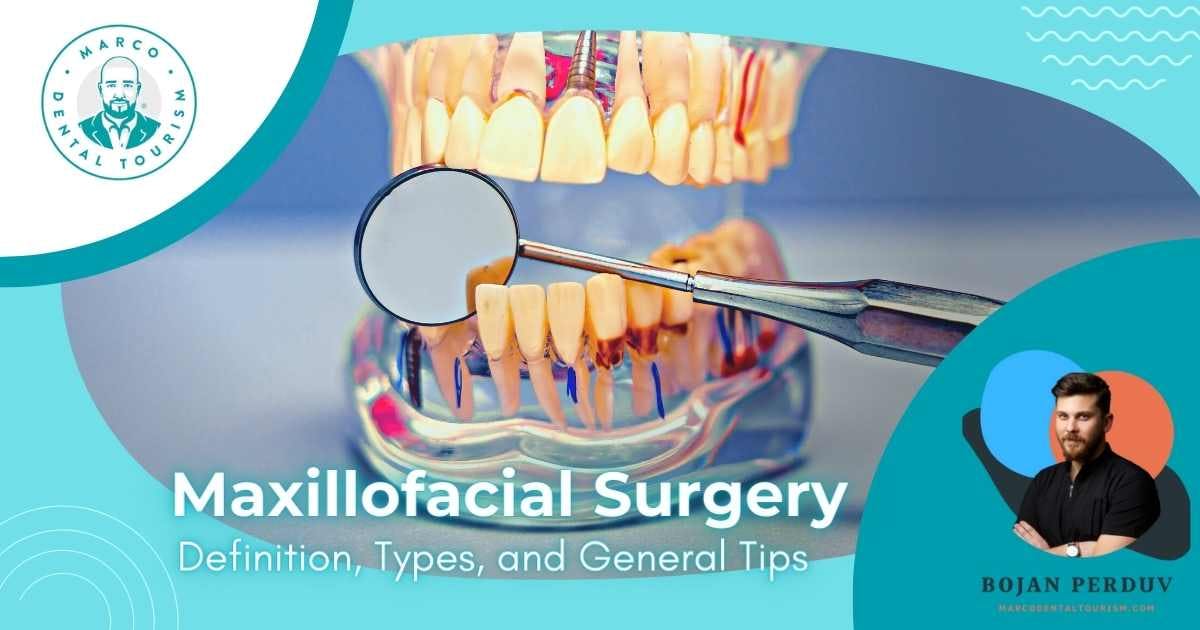Maxillofacial Surgery: Definition, Types, and General Tips

Do you know when the first maxillofacial surgery in history was performed? Believe it or not, the first oral procedure was performed at the beginning of the 19th century. This blog explores maxillofacial surgery, from what it entails, and what types of procedures are available, to the risks and benefits of this type of surgery. We will also discuss how to prepare for surgery, as well as the recovery process and tips for quickly returning to your daily activities.
What is maxillofacial surgery?

Maxillofacial surgery is a specialized form of surgery related to the prevention, diagnosis, and treatment of diseases, injuries and deformities of the face, jaw, and mouth. It is a safe and effective way to improve the appearance and function of the face, tailored to the individual patient and their needs.
What does maxillofacial surgery include?

Maxillofacial surgery is a specialized field of medicine that deals with problems and surgery of the face, mouth, and jaw in order to restore and achieve natural function and aesthetics. It includes a wide range of dental and medical procedures for the treatment of various dental diseases, the most common of which are:
- Orthognathic surgery: Orthognathic surgery refers to the correction of misalignment of the jaw and other abnormalities of the hard and soft tissues of the face, mouth, and jaw in order to improve the function and aesthetic appearance of the bite and jaw.
- Dental implants: This type of surgery is the replacement of missing teeth using artificial titanium posts.
- Temporomandibular joint (TMJ) surgery: This surgery relieves pain and corrects any dysfunction of the jaw joint.
- Facial trauma surgery: This may involve rebuilding facial bones and soft tissues that have been damaged by trauma or injury to the face and jaw.
- Oral pathology: Oral pathology is responsible for the diagnosis and treatment of tumors, as well as cysts of the mouth and jaws.
What injuries require maxillofacial surgery?

Common injuries requiring maxillofacial surgery include facial fractures, jaw fractures, and soft tissue injuries. Also, maxillofacial surgery is used to treat facial asymmetry, cleft lip and palate, or disorders of the temporomandibular joint, which are treated extremely successfully today.
When is surgical correction of the jaw recommended?

Jaw surgery is recommended for difficulties with chewing, speaking or breathing due to the incorrect position of the patient's jaw. Also, the procedure is performed in case of jaw injury, facial deformity or for aesthetic reasons. With the help of an experienced surgeon, you can eat, talk and sleep without worry again.
How to prepare for maxillofacial surgery?

Preparation for a maxillofacial procedure can be a significant help for a more carefree experience and faster recovery. Start by researching and understanding the entire procedure. Talk to your doctor and share any doubts with him. Be sure to follow all instructions before surgery and follow a healthy diet.
Below we recommend a few more practical tips that can facilitate and ease the process of preparing for the intervention:
- Consult with your dentist and surgeon: Ask your doctor about the complete surgical procedure, possible risks and side effects, as well as any special preparatory steps that need to be taken.
- Be organized: Make sure you have all the necessary paperwork, medications, and other items ready for your surgery date.
- Eat healthy: Eating nutritious foods can help your body heal faster, as well as provide the energy needed for the recovery process.
- Maintain regular dental hygiene: Take care of dental health - brush and floss daily, and use mouthwash to reduce bacteria that can cause infection.
- Get enough rest: Be sure to get enough sleep before and after surgery to make sure your body is rested and ready for the procedure.
- Provide the necessary therapy: Make sure you have access to all the necessary medicines, as well as all the necessary food for the period after the operation.
- Follow the instructions you receive: Take everything prescribed, attend pre-surgery appointments and follow all necessary instructions. Preparation can help you feel calm, reduce stress, and ensure a smooth recovery.
What does the jaw surgery procedure look like?

Dental jaw surgery is a complex procedure that requires professional precision and care. It involves reshaping the bone and soft tissue around the jaw to achieve symmetry. The operation is performed under anesthesia and requires several visits to the dentist, and the result is improved speech and the ability to chew.
What does postoperative care mean?

Postoperative care after maxillofacial surgery is necessary to ensure good wound healing and easier recovery. It includes regular dental visits, following instructions for proper care of the affected area, therapy that helps with pain and swelling, as well as maintaining oral hygiene.
In order to ensure an easy and quick recovery, we suggest you follow the following steps of proper home care:
- Strictly avoid smoking and drinking alcohol: Smoking and drinking alcohol can delay the healing process and significantly increase the risk of infection in the affected area.
- Do not practice sports and strenuous physical activities: Strenuous activities such as lifting weights can increase the risk of complications and prolong recovery time. Seek medical advice on when it is best to return to your normal pace.
- Monitor for potential signs of infection: Patients should be aware of signs of infection such as redness, pain, or swelling that does not go away. Timely treatment can help prevent further complications.
- Use cold packs: Applying cold packs is helpful in reducing swelling, pain, and inflammation. Wrap the ice in a towel or cloth and hold for fifteen minutes several times a day.
- Keep the affected area clean as directed: To maintain hygiene, wash your face gently with soap and water, dry with a clean towel, and apply antibiotic ointment as directed. Be sure to avoid sharp movements or strong pressure.
How to reduce risks and complications after surgery?

By carefully following the doctor's instructions, you can significantly reduce the risks and complications after any maxillofacial procedure. Take the prescribed therapy, avoid smoking and alcohol, and schedule a regular post-operative examination. Eating healthy, getting plenty of rest, and drinking fluids will speed up recovery time.
What are the most common ways to relieve pain and discomfort?
Pain relief after surgery can be achieved with a combination of medications, cold compresses, and rest. Over-the-counter pain relievers as well as ice packs can help reduce swelling and discomfort. Finally, by resting, you give the body the time it needs for healthy and successful healing.
Conclusion on maxillofacial surgery

In this blog, we discussed the progress of maxillofacial surgery and its many possible benefits - from improving speech, chewing and breathing, to achieving facial symmetry and restoring self-confidence. From the latest techniques to the highest quality care, maxillofacial surgery has a lot to offer everyone. With the help of an educated and dedicated team of surgeons, along with technological development, maxillofacial surgery is becoming an increasingly comfortable and pleasant experience for both doctors and patients.















Share your opinion!
What do you think about this topic?
Comments (0)